Sarahgraham
On this page, you find all documents, package deals, and flashcards offered by seller sarahgraham.
- 7
- 0
- 0
Community
- Followers
- Following
7 items
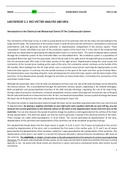
Figuring out EKG analysis for lab?
The contraction of the heart occurs in order to pump blood out of its ventricles and into the major arteries leading to the lungs and the body. The contraction of the cardiac muscle in both the atria and the ventricles is stimulated to contract by autorhythmic cells that generate the action potential, or depolarization, independent of the nervous system. These “specialized” muscle cells (fibers) are part of the conductive system of the heart, but it is the cells of the sinoatrial (SA) node t...
- Class notes
- • 20 pages •
The contraction of the heart occurs in order to pump blood out of its ventricles and into the major arteries leading to the lungs and the body. The contraction of the cardiac muscle in both the atria and the ventricles is stimulated to contract by autorhythmic cells that generate the action potential, or depolarization, independent of the nervous system. These “specialized” muscle cells (fibers) are part of the conductive system of the heart, but it is the cells of the sinoatrial (SA) node t...
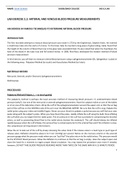
Need to check your lab answers on arterial pressure?
The first recorded attempt to measure blood pressure was made in 1733 by the Englishman, Stephen Hales. He inserted a small brass tube into the aorta of a horse. To this brass tube, he inserted a long piece of glass tubing. Hales found that the height of the column of blood that rose in the glass tube exceeded 8 feet. He also noted that when the heartbeat was, the level of the blood in the tube rose and fell several inches. In 1896, Riva-Rocci developed the modern method of blood pressure measu...
- Class notes
- • 8 pages •
The first recorded attempt to measure blood pressure was made in 1733 by the Englishman, Stephen Hales. He inserted a small brass tube into the aorta of a horse. To this brass tube, he inserted a long piece of glass tubing. Hales found that the height of the column of blood that rose in the glass tube exceeded 8 feet. He also noted that when the heartbeat was, the level of the blood in the tube rose and fell several inches. In 1896, Riva-Rocci developed the modern method of blood pressure measu...
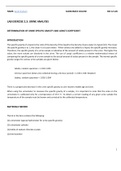
Want answers to urine analysis lab assignment?
The specific gravity of a liquid is the ratio of the density of the liquid to the thickness of pure water (1.0 grams/ml). The closer the specific gravity is to 1, the closer it is to pure water. When solutes are added to a liquid, the specific gravity increases. Therefore, the specific gravity of a urine sample indicates the amount of solute present in the urine. The higher the value, the more solutes are dissolved in the urine. The use of Long's coefficient is a relative mathematical means of ...
- Class notes
- • 11 pages •
The specific gravity of a liquid is the ratio of the density of the liquid to the thickness of pure water (1.0 grams/ml). The closer the specific gravity is to 1, the closer it is to pure water. When solutes are added to a liquid, the specific gravity increases. Therefore, the specific gravity of a urine sample indicates the amount of solute present in the urine. The higher the value, the more solutes are dissolved in the urine. The use of Long's coefficient is a relative mathematical means of ...
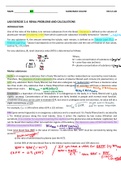
Got renal calculations?
One of the kidney's roles is to remove substances from the blood. Clearance is the volume of plasma per minute (ml plasma/min) from which a particular substance is totally removed or “cleared.” For any substance A, the amount entering the tubule, each minute, is defined as its Tubular Load (TLA), or Filtered Load (FLA). Tubular load depends on the plasma concentration and the rate of filtration of that solute, such as TLA = PA x GFR
- Class notes
- • 7 pages •
One of the kidney's roles is to remove substances from the blood. Clearance is the volume of plasma per minute (ml plasma/min) from which a particular substance is totally removed or “cleared.” For any substance A, the amount entering the tubule, each minute, is defined as its Tubular Load (TLA), or Filtered Load (FLA). Tubular load depends on the plasma concentration and the rate of filtration of that solute, such as TLA = PA x GFR
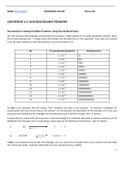
Need help solving acid-base balances?
pH is the measure of the hydrogen concentration of the solution: -log[H+] where [H+] is usually expressed in moles/L. Don’t let the word log scare you – it simply means the number over the base ten (i.e., the exponent). Thus, each unit increase in the pH value represents a ten-fold reduction in the concentration of H+.
- Class notes
- • 13 pages •
pH is the measure of the hydrogen concentration of the solution: -log[H+] where [H+] is usually expressed in moles/L. Don’t let the word log scare you – it simply means the number over the base ten (i.e., the exponent). Thus, each unit increase in the pH value represents a ten-fold reduction in the concentration of H+.
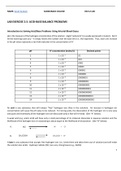
Need help solving acid-base balances?
pH is the measure of the hydrogen concentration of the solution: -log[H+] where [H+] is usually expressed in moles/L. Don’t let the word log scare you – it simply means the number over the base ten (i.e., the exponent). Thus, each unit increase in the pH value represents a ten-fold reduction in the concentration of H+.
- Class notes
- • 13 pages •
pH is the measure of the hydrogen concentration of the solution: -log[H+] where [H+] is usually expressed in moles/L. Don’t let the word log scare you – it simply means the number over the base ten (i.e., the exponent). Thus, each unit increase in the pH value represents a ten-fold reduction in the concentration of H+.
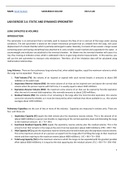
Having trouble solving the total lung capacity?
The spirometer is an instrument that is normally used to measure the flow of air in and out of the lungs under varying conditions. The wet spirometer is based on the simple mechanical principle that air, exhaled from the lungs, will cause displacement of a closed chamber which is partially submerged in water. Basically, it consists of two vessels: a larger vessel containing water and having a breathing hose attached to it; and a smaller vessel inverted and suspended in the water. A counterwe...
- Summary
- • 11 pages •
The spirometer is an instrument that is normally used to measure the flow of air in and out of the lungs under varying conditions. The wet spirometer is based on the simple mechanical principle that air, exhaled from the lungs, will cause displacement of a closed chamber which is partially submerged in water. Basically, it consists of two vessels: a larger vessel containing water and having a breathing hose attached to it; and a smaller vessel inverted and suspended in the water. A counterwe...
